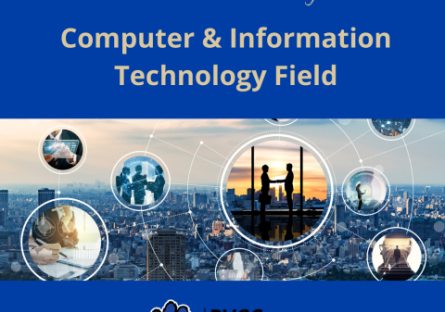
With expertise ranging from a broad array of careers within the field of Computer and Information Technology, the five alumni panelists shared their experiences at PVCC and how they ultimately landed in their current employment. Each panelist commented on emerging areas in technology and important skills and attributes they think current graduates should possess.
The inspiring panelists and their current professions:
- Emily Andrzejewski – Software Engineer
- Christina Dakroub – Computer Programmer
- James Huffman – Software Engineer
- Richard Lang – IT Security Director
- Kaye Sylvester – Network Specialist
What advice would you like to share for current students interested in the Computer & Information Technology FOI (Field of Interest)?
Emily – The technology field is so diverse. Network with a diverse group of people. You don’t have to be an expert in everything. Find out what you enjoy. It’s okay to change your area of focus. Look at future career prospects as fields change over time. See what employers are focusing on in terms of skills and what areas of technology are in demand.
James – Put yourself out there. Don’t let things intimidate you. Keep your options open and try new things. Interviewing is a skill. Make yourself an expert at being interviewed. Create your own repository of code, so an interviewer can look at it. Keep your eyes open for opportunities. I have bounced around to 12 different teams at GoDaddy and have acquired new skills and learned to work with a variety of people.
Kaye – You are never done learning. There are always new certifications and new technologies to learn. Be prepared to keep going and to keep learning.
Richard – Use all the tools that are out there to discover the variety of professional and career opportunities available to you. Plan for multiple careers. Develop your own support team as you make changes and transitions. Be prepared to fail and fail fast and early. Don’t allow failure to get you down. Use your network; use Twitter and LinkedIn and follow others’ feeds. Find authors you are interested in and follow them. Learn how to have conversations and participate in MeetUp groups. There are all kinds of opportunities to network.
Christina – Your time is money. People don’t always have your best interests in mind. I took classes at another school that did not transfer. Meet with an academic advisor to map out your coursework and insure it will transfer if you plan to go on to another institution. Follow your instincts. Education is an investment in you.
Is there anything you would have done differently on your educational journey?
Emily – Invest in developing your soft skills. You learn more from your mistakes than you do from your triumphs. Don’t be afraid to reach out to others for assistance and support. Fresh eyes always help. Don’t compare yourself to others, only compare yourself to you. Use others achievements as inspirational goals. Don’t rush; bake in quality to your code. You’ll probably think of a better way of doing things as you go.
Richard – Focus on, savor and enjoy the experience. I was in a hurry to do things. Set clear objectives and measurements as to when it’s time to move on. Don’t be afraid to strike out on your own. Reward yourself; recognize what you do and your accomplishments. Take time to take advantage of opportunities. Enjoy the journey.
Kaye – I went back to school at 35. If you feel it, do it! Don’t let people tell you it’s a bad idea.
Christina – Everything starts with the human experience. There can be financial and political constraints, so you have to look at what’s right for the task at the time. Know your audience, whether it’s humans or bots. Every situation is different. There is constant change and sometimes exponential change.
How can one achieve career advancement in this area?
Richard – You don’t have to be a master at everything. In addition to moving up the rungs of your career ladder, consider moving from ladder to ladder. Think about how you want to develop your portfolio. If you are interested in something, you’ll put more effort into it. Opportunities come when you are focused, engaged and excited about something. Focus on your strengths and work with what you’ve got. Find those people who will give you feedback and support you.
Emily – You don’t have to be an expert in everything, you just have to have the ability and desire to learn. Soft skills are important. Be a good team player. Know the time and place to assert yourself. Learn how to advocate for yourself. Showcase all the work you’re doing.
More great advice from the panelists:
As a student, professional conferences are practically free to attend. You will be side-by-side with professionals and meet those with similar interests. There are amazing opportunities worth the investment. He recommended the Grace Hopper Conference among others. Join professional associations as a student.
Go out and make contributions to open source libraries. Look up salary transparency laws. Even if you’re happy in your position, it’s okay to interview.
As a woman in the IT field, you have to deal with biases and not run away from the biases you may experience. You may need to develop a thick skin. You must stand up for yourself and be heard.
Voice your opinion. It’s okay to talk. Recommend reading “Lean In” by Sheryl Sandberg. I spent time outside of work learning framework. Block off time during work to learn new technology. Learn to balance your time.
Helpful Resource: O*NET Online: https://www.onetonline.org/